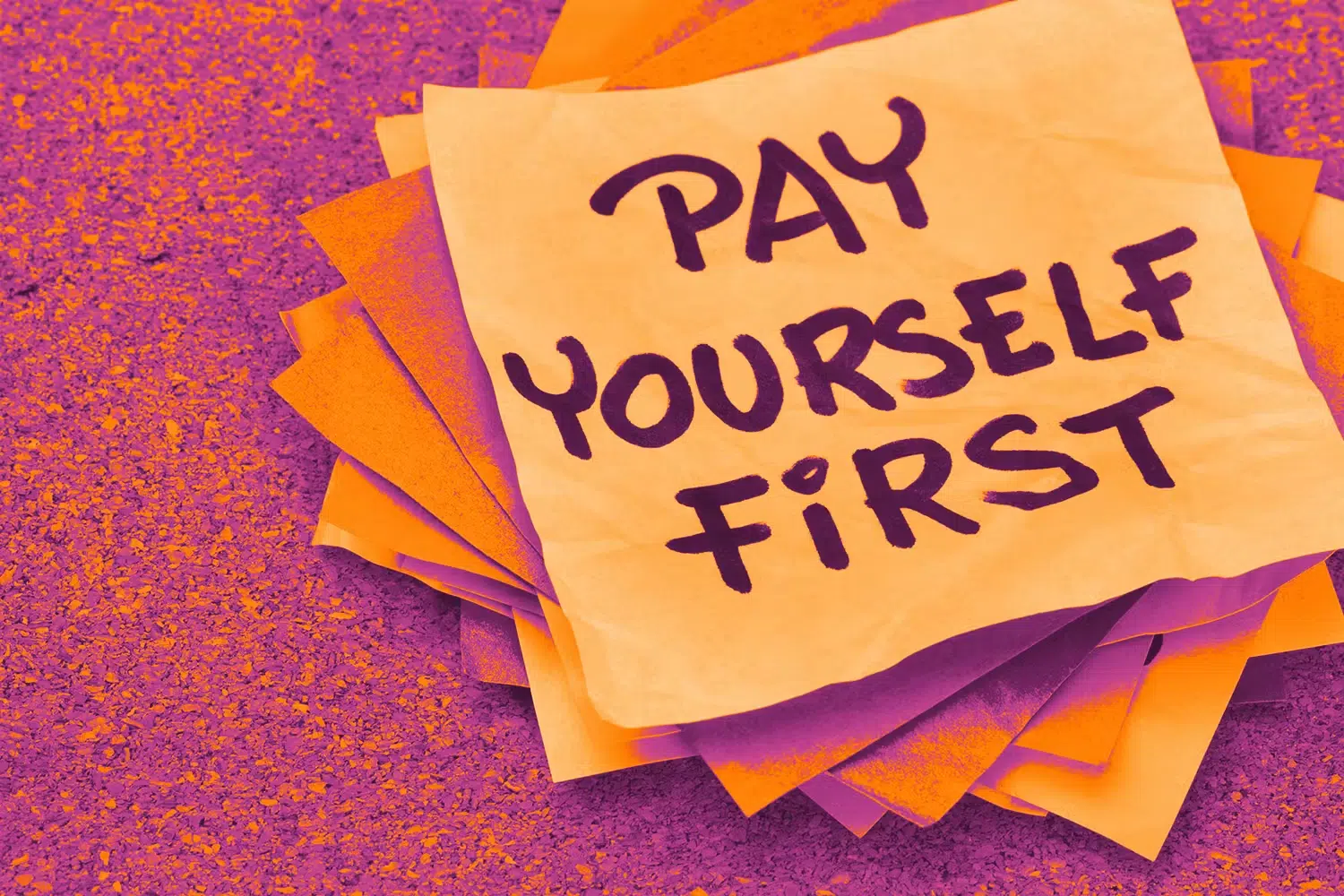
What Does It Mean to Pay Yourself First?

Whether you feel like saving money is a goal that is out of reach, or you’d simply like to become more disciplined at setting aside money each month, there’s a personal finance strategy that you can likely benefit from: paying yourself first.
Depending on your income, it’s not always possible to pay yourself first. This article is meant to provide a basic understanding of what automated saving can do for you, but we recognize that might not be possible with your current financial situation. It can be frustrating to hear that you should save, but your expenses and income just won’t allow it.
We don’t want to frustrate you—we want to give you useful advice now so when you can save, you’re ready to put a plan in place. In this article, we’ll break down what paying yourself first means, why it’s important, and how to do it.
What does it mean to pay yourself first?
Paying yourself first refers to setting aside money for your savings before you pay bills, purchase things you want, or think about any other financial obligations.
While you can pay yourself first by putting money into a savings account or emergency fund, this can also mean:
- Investing funds into a retirement account such as an IRA, 401(k), or other retirement investment accounts
- Setting money aside for health-related expenses in a Health Savings Account (HSA)
- Investing in the stock market, bond, etc. for long-term savings
Typically, paying yourself is an automated process. This means that you set a specified amount of your take-home pay to transfer each month, week, payday— however you prefer— to your savings accounts. The bank will do it automatically, meaning you don’t even have to think about it!
Fee-Free Banking is Here
Looking for a financial institution that doesn’t nickel and dime you? If you live or work in Texas, join Amplify!
Why should you pay yourself first?
Paying yourself first helps you prioritize your long-term financial wellbeing and can help you achieve financial goals. Here are some reasons why this strategy is worth it:
- Anyone can do it: You don’t need to have a lot of extra cash sitting around each month to take advantage of paying yourself first. Even $20 a month adds up quicker than you’d think!
- It gets you in the habit of saving: Saving is just like any other good habit— it takes self-discipline and commitment to develop. By consistently paying yourself first, you form saving into a financial habit and mindset that will likely stick with you forever.
- It prevents you from spending past your budgeted amount: If saving is not your priority, it might not happen at all. If you set aside money in savings after all of your monthly spending is done, you may have less— or none at all— for your future self. Setting aside money in your savings vehicle first ensures that it gets done.
Perhaps most importantly, paying yourself first will help set you up for financial success down the line. We can’t predict the future, but it’s almost certain that you’ll need money to live. A little thoughtful planning now will go much further in the future.
How much should you pay yourself first?
You may be wondering how much, exactly, you should be automatically transferring into savings each month. All financial experts would agree that setting aside something is better than nothing. Though there is no set amount that you should set aside, it’s always a good idea to take the time to sit down and work out a number that works best for you. The best way to do this is to build a budget that accounts for saving each month. In three steps, you can determine a rough estimate of how much money you can set aside for savings each month.
1. Assess your monthly income.
How much money do you bring in each month? Be sure to include other types of income other than wages, such as dividends, interest, and child support.
2. Consider your monthly expenses.
Next, think about how much you spend each month. Tally up your:
- Fixed expenses: Add your monthly necessities that don’t change much month-to-month like housing, food, transportation, and debt repayment.
- Discretionary expenses: Average your monthly spending on things like entertainment, special treats, and hobbies.
- Semi-annual or yearly costs: If you pay bills such as car insurance on an annual or semi-annual basis, be sure to calculate the monthly costs.
- Irregular expenses: Factor in costs that don’t have a monthly pattern like holiday gifts, vacations, and car maintenance.
Add these together to find your total monthly expenses. Hopefully, your income is more than your expenses. If this isn’t the case, you will need to adjust your monthly spending and cut out some discretionary expenses each month.
3. Set a monthly savings amount.
Next, set a monthly savings goal. Many financial experts recommend setting aside 10% to 20% of your monthly income for savings, but you may have a more specific number in mind. Add your “savings” category to your monthly expenditures.
Do your monthly expenses (including your savings) now exceed your monthly income? If so, you’ll need to trim down your monthly spending or lower your savings amount. If your expenses are still lower than your income, that means you have even more money to stash away in savings or for other financial goals, like investing.
4. Set up automatic savings.
Once you have a number, don’t forget to set up automatic transfers into your savings or retirement account!
Should you always pay yourself first?
Paying yourself first is a general rule of thumb— but it doesn’t necessarily mean it’s best for everyone’s unique circumstances. For instance, if you have a lot of expensive, high-interest debt, it might be in your best interest to focus your efforts on getting that debt paid off first than to save 20% of your income.
In this scenario, paying off debt will help you free up your monthly cash flow, allowing for more savings opportunities in the future. Putting off debt repayment in order to save may lead you to falling further into debt, hurting your credit score and overall financial situation.
Use common sense when implementing personal finance strategies or speak to a professional financial planner who can give you specific advice.
Get Your Savings on Track Today
Get started on your savings journey by opening up a fee-free savings and checking account with Amplify Credit Union, which can help you manage and keep your money safe. Already have an account? Speak with a CFS* financial advisor who can work with you to build a map to help meet your financial goals.
*Non-deposit investment products and services are offered through CUSO Financial Services, L.P. (“CFS”), a registered broker-dealer Member FINRA/SIPC and SEC Registered Investment Advisor. Products offered through CFS: are not NCUA/NCUSIF or otherwise federally insured, are not guarantees or obligations of the credit union, and may involve investment risk including possible loss of principal. Investment Representatives are registered through CFS. The Credit Union has contracted with CFS to make non-deposit investment products and services available to credit union members.
Prepared by Broadridge Investor Communication Solutions, Inc. Copyright 2018.
Become an Amplify Member
Every Amplify account holder enjoys fee-free banking. That means no overdraft, maintenance, or other banking fees cutting into your pocket.


